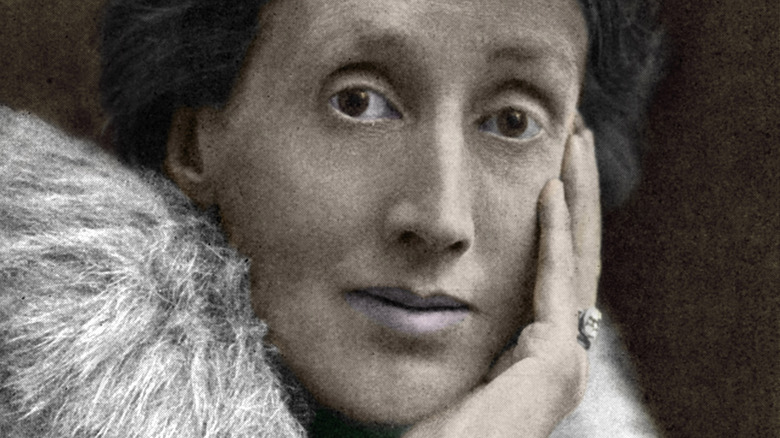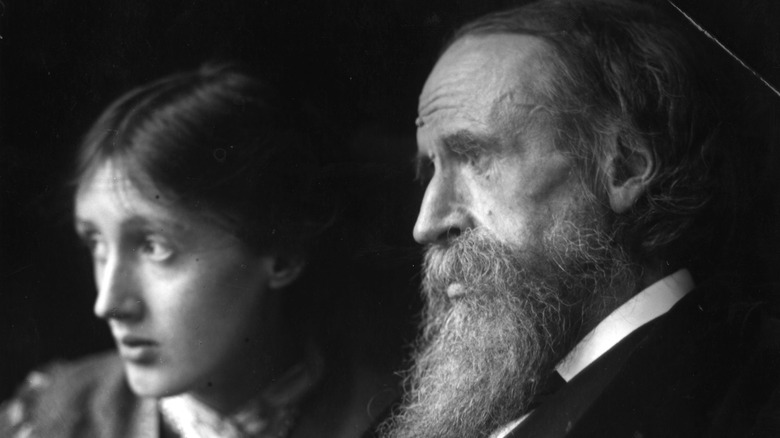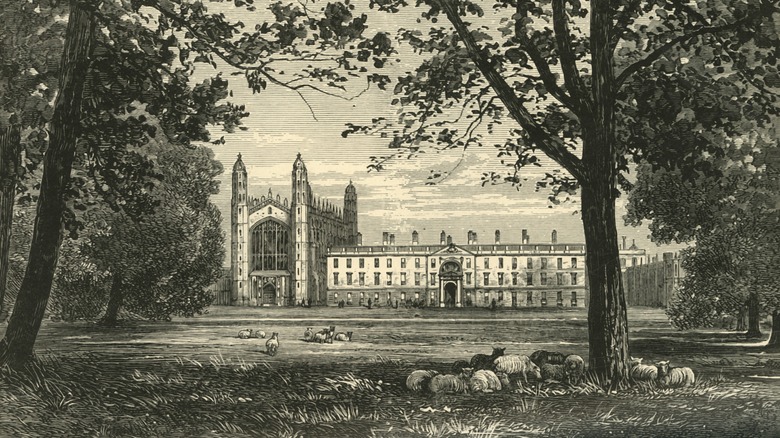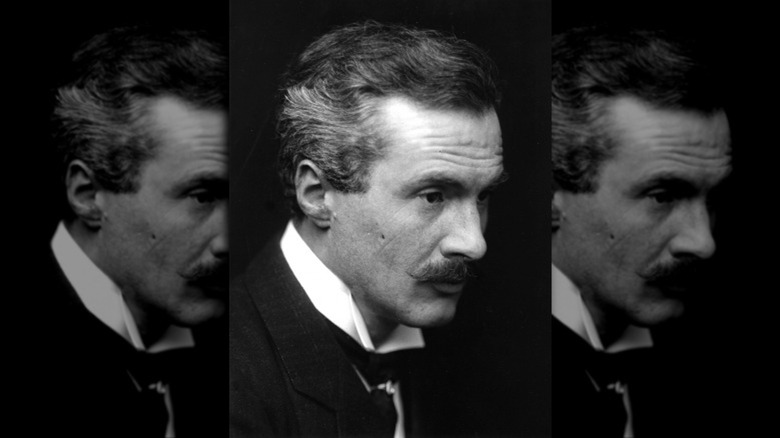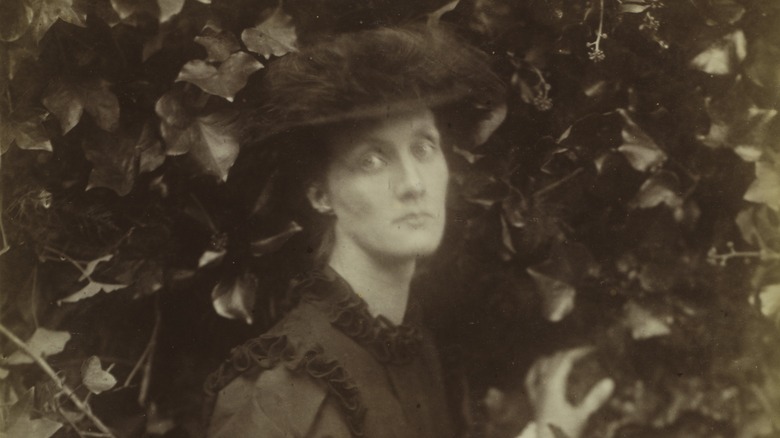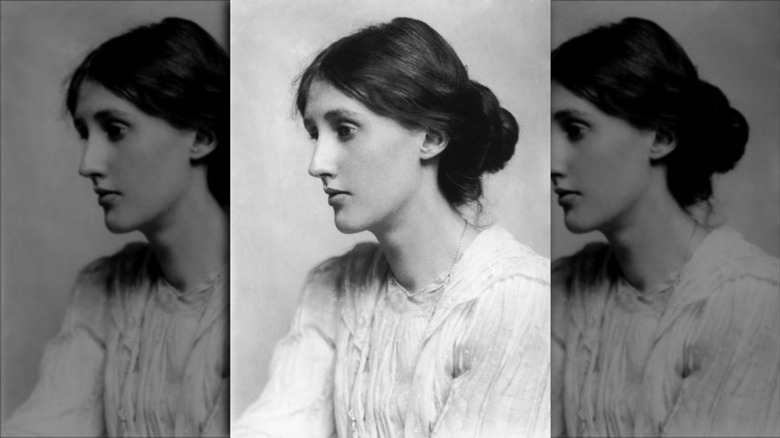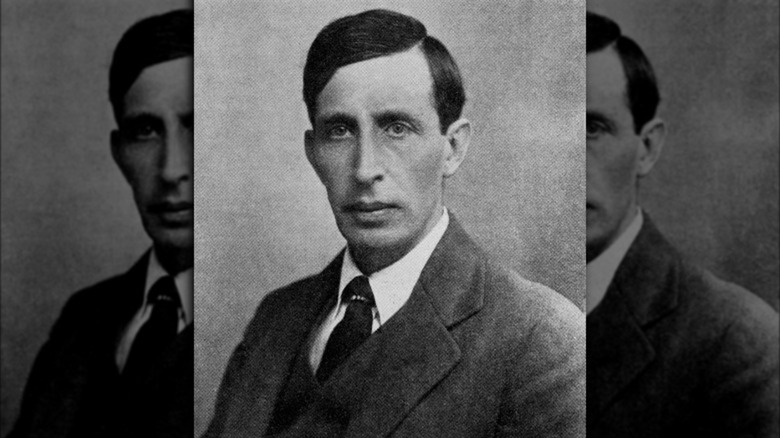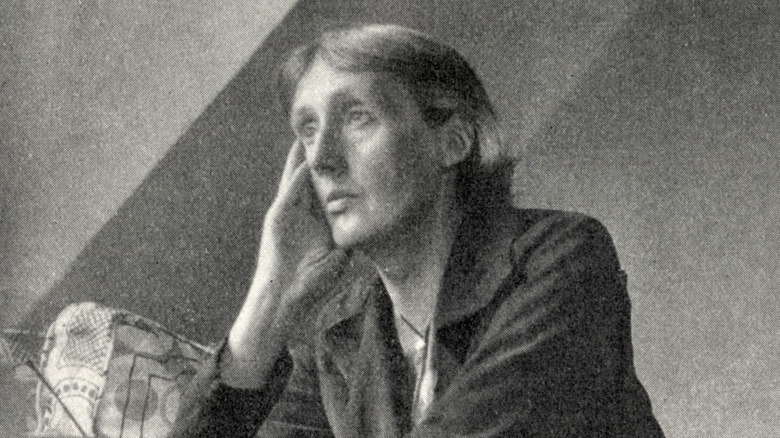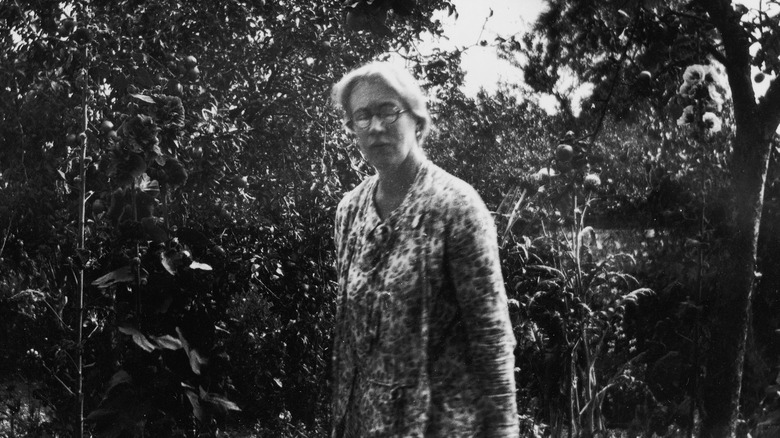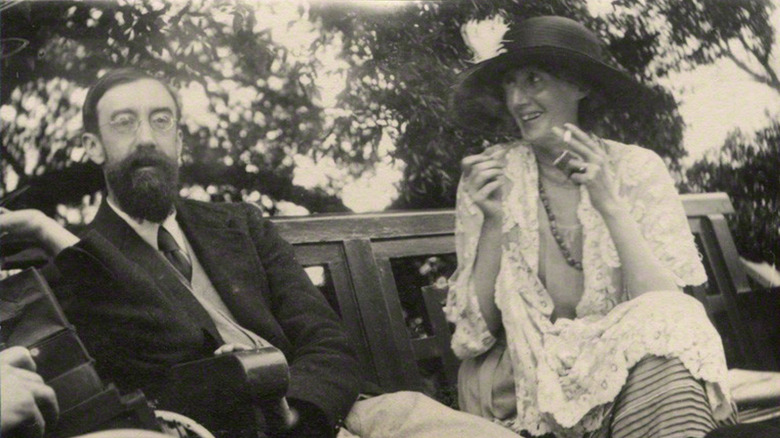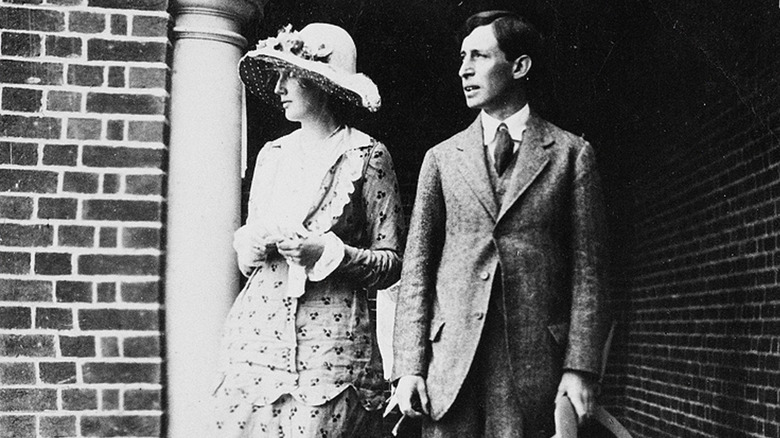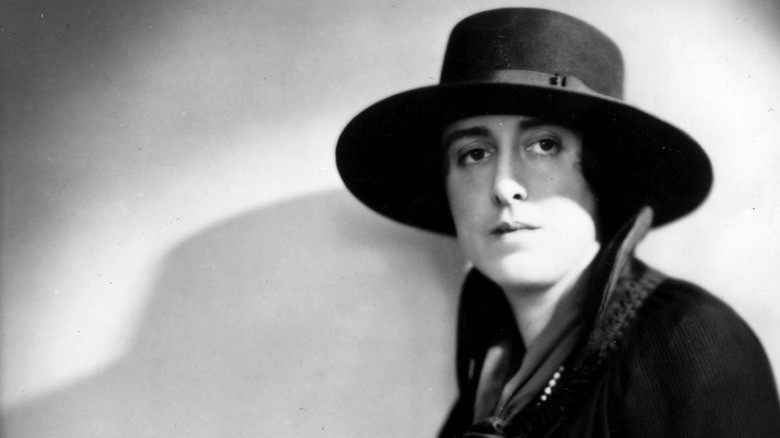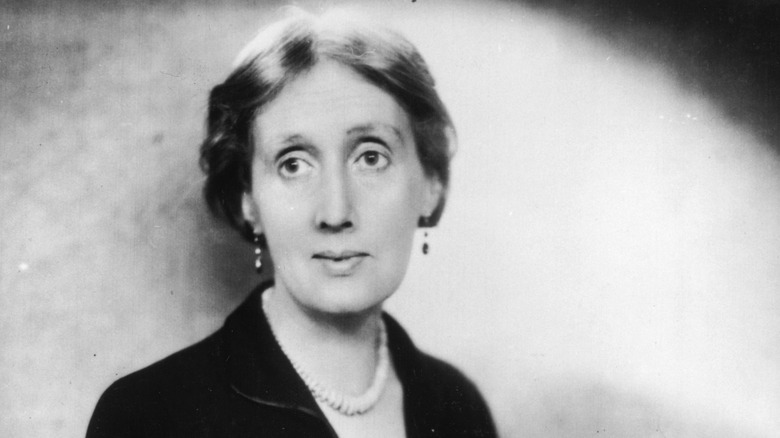Virginia Woolf's Tragic Real-Life Story
From notable feminist works like "Three Guineas" and "A Room of One's Own" to her famous stream-of-consciousness novels like "Mrs. Dalloway" and "Orlando," Virginia Woolf's rich literary canon is as diverse as it is unique. However, while her bold, experimental style led her to create unparalleled works that are renowned to this day, her literary genius was also tempered by a lifelong struggle with mental health issues.
Woolf, who may have had bipolar disorder, experienced intense periods of mania and deep depressive states throughout her life. She suffered numerous nervous breakdowns, which led her to be institutionalized, and she attempted suicide multiple times before finally succeeding at the age of 59. Although she may have tragically left the world too soon, her novels, essays, diaries, and letters all continue to live on, and her work has been translated into more than 50 different languages, according to Books Tell You Why.
Woolf's parents were both widowed
The girl who would grow up to become the acclaimed writer Virginia Woolf was born Adeline Virginia Stephen on January 25, 1882, in London. Her father, Leslie Stephen, was a writer, literary critic, and the first to serve as the editor of the Oxford Dictionary of National Biography. while her mother, Julia Prinsep Jackson, was a well-connected, beautiful woman who had worked as a model for Pre-Raphaelite painters like Edward Burne-Jones, according to Shmoop.
Although Woolf was raised in an upper-middle-class literary household, her family life was complicated, with both of her parents having been previously married and widowed. Her father, who Woolf would describe as overbearing and a tyrant, had been previously married to Harriet Marian Thackeray, the daughter of novelist William Thackeray. She passed away giving birth to their first daughter, Laura Stephen, who suffered from schizophrenia and was institutionalized in her teens, per Columbia College. Jackson had two sons, George and Gerald, and a daughter Stella, by her first husband, Herbert Duckworth, to whom she was suddenly widowed with three young children after just three short years of marriage. After Leslie and Julia were married in 1878, they went on to have four more children together: Vanessa, Thoby, Adeline Virginia, and Adrian.
Woolf couldn't receive a formalized education because of her gender
Virginia Woolf's upbringing was further complicated by the mere fact that she was a bright and intellectually ambitious woman, with a clear talent for writing, who was born into a time when most young women were not expected to receive a formal education.
From the very beginning of her life, Woolf was surrounded by books. But although she was largely given free reign of her father's ample library, and her home was a frequent stop for important intellectual and literary personalities like William Thackeray, Henry James, and her godfather, the poet James Russell Lowe, she was also raised during the strict Victorian period when respectable women did not pursue lofty intellectual goals, per Shmoop.
It was a fact that vexed Woolf from a fairly young age. She read and wrote on her own voraciously, but she resented the fact that she was not permitted to receive formalized intellectual training at elite institutions of higher learning. Her older brothers all attended Cambridge University, but Woolf was instead educated at the less prestigious Ladies' Department of King's College London, according to Biography.
Virginia Woolf was abused as a child
While, by many accounts, Virginia Woolf enjoyed a privileged childhood, her early years were marred by significant trauma and abuse. As a young girl, Woolf suffered abuse at the hands of two of her older half-brothers, a fact that she did not admit until much later in her life. Her mother's sons by her earlier marriage, George and Gerald Duckworth, who were 15 and 16 years older than her, respectively, both assaulted Woolf. Gerald began abusing Woolf when she was just six years old, while George (pictured), whom she described as having "violent guts of passion," began assaulting her following the death of their mother, with Woolf terming his actions "a little better than a brute's," according to the Brazilian Journal of Psychiatry.
In a memoir, she recounted the traumatic experience, writing: "I remember resenting, disliking it — what is the word for so dumb and mixed a feeling? It must have been strong, since I still recall it." Throughout her life, Woolf would struggle with sexual intimacy, as well as with her mental health, and it is likely that she viewed her writing as a way to help work through this childhood pain.
If you or someone you know may be the victim of child abuse, please contact the Childhelp National Child Abuse Hotline at 1-800-4-A-Child (1-800-422-4453) or contact their live chat services.
Virginia Woolf lost multiple family members at a young age
Virginia Woolf was dealt a traumatic blow in 1895, when her mother (pictured) died suddenly and unexpectedly from influenza at the age of 49, when Woolf was just 13, according to Britannica. Understandably devastated, Woolf entered a period of depression that lasted about a year, calling her mother's death "the worst disaster that could happen," per Lumen.
Tragically, just as it appeared that Woolf was emerging from the darkness, her older half-sister, Stella Duckworth, who was a role model to Virginia and had taken on the role of family caretaker following their mother's death, was struck with pregnancy-related peritonitis shortly after her marriage to the politician Jack Hills and died at the age of 28 in 1897. Woolf's older brother, Thoby, also died very young, contracting typhoid fever in 1906 and passing away from complications related to the disease at just 26 years of age.
The string of losses deeply impacted Woolf, and her mental health deteriorated after the death of her father in 1904, leading to a nervous breakdown.
Woolf first attempted suicide at the age of 22
Still reeling from the loss of so many close loved ones in such a short time, Virginia Woolf suffered a breakdown after also losing her father, who died from stomach cancer in 1904, when she was still only 22 years old, per Biography. Stricken with grief after his passing, so soon after the deaths of her mother and half-sister, Woolf made her first attempt to end her own life, according to the Brazilian Journal of Psychiatry. Luckily, she survived the incident relatively unscathed physically. However, she was briefly hospitalized for psychiatric treatment, where Woolf was diagnosed as "neurasthenic," a loose diagnosis that includes irritability, emotional disturbance, and fatigue. Today, researchers believe it is more likely that Woolf suffered from bipolar disorder.
According to Columbia College, doctors prescribed barbiturates to help tame her suicidal impulses, as well as lots of silence and bed rest. Over the course of her life, taking time away from heavy intellectual pursuits like reading and writing would become a common recommendation for Woolf. With some doctors recommending "total rest of the intellect," she would occasionally have to take long breaks from her work as a writer, sometimes not even composing letters or writing in her diary for periods of time, per Newsweek.
If you or anyone you know is having suicidal thoughts, please call the National Suicide Prevention Lifeline at 1-800-273-TALK (8255).
Woolf didn't accept her husband's proposal right away
From 1912 until the end of her life, Virginia Woolf was married to a civil servant and fellow writer Leonard Woolf (pictured), a former classmate of her brother Thoby, whom she had first met while visiting him at Trinity College, Cambridge, in 1900. Leonard described Virginia, along with her sister Vanessa, as "young women of astonishing beauty ... It was almost impossible for a man not to fall in love with them" (via Literary Ladies Guide). However, he did not begin courting her until after his return to London from a one-year leave in late 1911. In the meantime, Virginia had already received another marriage proposal from biographer Lytton Strachey. He later rescinded the offer, only to suggest to Leonard that he should be the one to propose instead, calling her "the only woman in the world with sufficient brains, it's a miracle that she should exist; but if you're not careful you'll lose the opportunity," according to The American Reader.
Leonard first proposed in early 1912, but Virginia waited several months before finally accepting his proposal on May 29. They were wed on August 10, when she was already considered an "old maid" at the ripe old age of 30. (He was 31.) While their marriage was a complicated one at times, Leonard and Virginia cared deeply for one another. However, Woolf's ongoing mental health issues and discomfort with sexual intimacy proved to be a significant obstacle in their relationship.
Woolf attempted suicide shortly after getting married
Shortly after her marriage to Leonard, Virginia Woolf published her first novel, "The Voyage Out." It seemed as though it should have been a joyous time in her life, but Woolf was struggling with depression, self-doubt, and fear of criticism of her new book. She attempted suicide for a second time in 1913, just months into her marriage, and she was almost successful, per the Brazilian Journal of Psychiatry.
This incident would also seem to set the tone for the rest of their marriage. Woolf would suffer from nervous breakdowns, deep depression, and wild manic episodes, while Leonard kept a close watch over her, monitoring everything from her mood swings to her weight, per Newsweek. "He sits on the edge of the bed and considers my symptoms like a judge. He brings home huge pineapples: he moves the gramophone into my room and plays until he thinks I'm excited. In short, I should have shot myself long ago in one of these illnesses if it hadn't been for him. And I can't sacrifice his peace of mind, yet the obstacle is surely now a dead hand, which one should no longer let dominate our short years of life," she said of Leonard in a letter, via Smith College.
If you or anyone you know is having suicidal thoughts, please call the National Suicide Prevention Lifeline at 1-800-273-TALK (8255).
Woolf's poor mental health prevented her from ever having children
"Again, I want everything — love, children, adventure, intimacy, work," Virginia Woolf wrote in a letter to Leonard before their marriage (via Literary Ladies Guide). However, children were never in the cards for Woolf, despite her expressed desire to have them. She adored her sister's children and wanted to have her own one day, but tragically, her family felt that her nervous breakdowns precluded her from ever being able to bear and raise a child of her own.
Woolf spent several years in and out of institutional rest homes for her nerves, and her husband and her sister Vanessa (pictured), as well as her doctors, felt she was too unstable to ever be up to the task of motherhood. "The risk she runs is that of another bad nervous breakdown and I doubt if even a baby would be worth that," Vanessa wrote of the decision, via Newsweek. But Woolf wished to be a mother and blamed herself for her failing. "We aren't going to have a baby, but we want to have one," she wrote in her diary. In a 1926 letter, she stated, "A little more self-control on my part, and we might have had a boy of 12, a girl of 10."
If you or someone you know is struggling with mental health, please contact the Crisis Text Line by texting HOME to 741741, call the National Alliance on Mental Illness helpline at 1-800-950-NAMI (6264), or visit the National Institute of Mental Health website.
Virginia Woolf was sensitive about her work
In spite of her obvious literary prowess, Virginia Woolf was exceptionally sensitive to criticism. The periods of her most intense struggles with mental health would often follow the publication of one of her books.
One of Woolf's most serious breakdowns came shortly after the publication of her first novel, "The Voyage Out," which she had written "with a kind of tortured intensity," according to her husband, via Newsweek. The book's publication had to be delayed because she was forced to spend the next six months in a rest home for her nerves. The novel was well-received, and after her release, Woolf seemed to briefly find peace with her work, writing, "My writing now delights me solely because I love writing and don't, honestly, care a hang what anyone says. What seas of horror one dives through in order to pick up these pearls — however they are worth it."
However, the peace was short-lived. According to the British Library, Woolf never really became comfortable opening her work up to public scrutiny, even as she gained more literary recognition, as she often dreaded criticism and fretted over feedback about her writing. Submitting her work and waiting to hear back from publishers was another major source of stress for Woolf, per The Guardian.
Leonard started Hogarth Press to help calm Virginia's nerves
In 1917, Virginia Woolf and her husband Leonard launched Hogarth Press, a literary press that they ran out of their home in Richmond, in large part because he believed it would provide a therapeutic break from the stresses of writing, according to the British Library. Many of her doctors had suggested that the intellectual strain of reading and writing might worsen Woolf's condition, so Leonard believed the challenge of running a printing press would engage and occupy her, while helping alleviate some of the anxiety that accompanied her literary pursuits.
Hogarth Press also granted Woolf a literary and creative freedom she had not experienced before. Up until then, all of her work had been published by her half-brother Gerald Duckworth, the same person who had abused her as a child and who, according to Woolf, didn't know "a book from a beehive," via The Guardian. But now, with their own press, she was free to publish her writings on her own, as well as seek out and give voice to other small, experimental works. Through Hogarth Press, the Woolfs published the writings of their friends, including many other notable writers like T.S. Eliot, Katherine Mansfield, E.M. Forster, and Sigmund Freud, according to the British Library.
Vita and Virginia
Although Virginia and Leonard Woolf were close partners, in work and in life, their relationship was certainly unconventional. Some even speculated that the marriage was never consummated, because Woolf's early trauma led to her developing a fear of sexual intimacy with men, per Newsweek. She was also attracted to women, and in 1922, she began an affair with a beautiful aristocratic writer ten years her junior named Vita Sackville-West (pictured).
According to Time, the two women met at a dinner party, and, despite both being married to men at the time, they soon became smitten with each other. "I am reduced to a thing that wants Virginia ... It is incredible how essential to me you have become," Sackville-West wrote to Woolf in 1926. The affair went on for ten years, and the pair remained friends even after the romance ended. Hogarth Press published much of Sackville-West's writing, and she became Woolf's real-life muse, serving as the inspiration for Woolf's passionate, experimental novel "Orlando," which was relatively successful when it was published in 1928.
Both of their husbands were well-aware of the affair. Leonard gave at least an implied approval, while Sackville-West's husband Harold Nicholson not only did not object but pursued same-sex extramarital affairs himself. However, the high society Sackville-West family disapproved of the same-sex relationship, and Vita's mother, the Baroness Sackville, was scandalized by the publication of "Orlando," accusing Woolf of "having changed my Vita and taken her away from me."
'If anybody could have saved me it would have been you'
On March 28, 1941, Virginia Woolf's long struggle with mental illness finally came to a tragic end. After a period of worsening health, with World War II raging and the threat of an impending German invasion looming, she attempted suicide once again, at the age of 59, and this time, she succeeded.
"Dearest, I feel certain I am going mad again. I feel we can't go through another of those terrible times. And I shan't recover this time. I begin to hear voices, and I can't concentrate. So I am doing what seems the best thing to do. You have given me the greatest possible happiness. You have been in every way all that anyone could be. ... If anybody could have saved me it would have been you," Woolf wrote to her husband in a note, concluding, "I don't think two people could have been happier than we have been" (via Brain Pickings). Leonard arranged to have Virginia cremated and spread her ashes around the home they had shared together.
If you or anyone you know is having suicidal thoughts, please call the National Suicide Prevention Lifeline at 1-800-273-TALK (8255).
